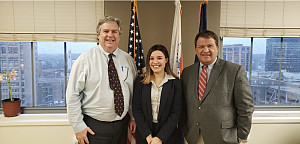Green Business Partnership. by Isabella Wrobel
May 13, 2019
Open gallery

This past year I was given the incredible opportunity to work for Green Business Partnership at the Westchester County Executive’s Office for the Director of Sustainability and Conservation, Peter McCartt in the Michaelian building located in White Plains. As my internship progressed throughout the months, I also began assisting the Director with duties associated with New York State programs such as Climate Smart Communities (CSC) and Clean Energy Communities (CEC). Both provide grant funding after certain green actions are achieved by the county. It was a tremendously rewarding experience that allowed me to build on my social, computational, and organizational skills whilst also learning the process of everyday administration duties of a Director. My day to day duties mostly included research but also sending emails, making phone calls, attending meetings with the Director.
Green Business Partnership (GBP) is an organization that focuses on assisting businesses to become sustainable. I was previously familiar with this program because I work part-time at a hotel who has already been certified by them. I attended our green team meetings and was given a brief breakdown of the actions required for certification. I was very excited to get started and very nervous to be down the hall from the County Executive, George Latimer himself. But on my first day I was greeted with genuine smiles and a warm welcome.
Climate Smart Communities (CSC) and Clean Energy communities (CEC) are both state programs that provide grant funding and technical assistance for local municipalities to achieve their certification. CSC was a larger program and took more of my time to work on. At first, I was required to do a ton of research and then communicate with other constituents for information or assistance on a certain action. There were 12 action categories but each one contained sub-actions with information about how to attain them and what documentation was required for submission. CEC on the other hand is based on choosing 4 out of their 10 high impact action items that consist of clean energy upgrading, LED streetlights, solarizing, acquiring clean fleets, and procuring an energy benchmarking policy (to name a few). Recently on February 20th, Westchester County has posted the following in their newsletter “Furthering his commitment to energy conservation and sustainability throughout Westchester, County Executive George Latimer has proposed the Westchester County Energy Benchmarking Policy”. This is a great achievement for Westchester and an opportunity for grant funding by NYSERDA. This would help measure the county’s greenhouse gas emission for their new Climate Action Plan which is currently being rewritten since its inception in 2008.
Through these programs, I’ve learned the importance of local sustainability and how gradual of a process it can be when trying to achieve certain requirements especially if they were policies. Even though our national government isn’t a part of a worldwide agreement to cut greenhouse gases like the Paris Agreement, there are still municipalities throughout the US who are working on leading their cities to environmental stewardship. My time there instilled much hope for the future of our cities and enthusiasm to be a part of it one day.